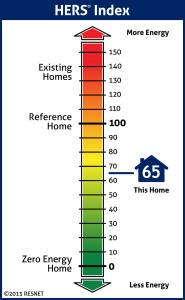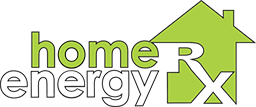HOME ENERGY RATINGS (HERS Ratings)
 Our energy professionals are trained and experienced RESNET™-certified HERS raters. RESNET is the Residential Energy Services Network; HERS is Home Energy Rating System, the standard of the U.S. Mortgage Industry for energy ratings of new and existing homes.
Our energy professionals are trained and experienced RESNET™-certified HERS raters. RESNET is the Residential Energy Services Network; HERS is Home Energy Rating System, the standard of the U.S. Mortgage Industry for energy ratings of new and existing homes.
What is a HERS Rating?
The HERS Index is a system for ranking a home’s energy performance. For a given home, a HERS Index is generated as if the home were built to the minimum requirements of the 2006 IECC Energy Code. This is called the reference home, with an index score of 100. Depending on how the house was actually built, the index may be higher or lower. If the house was built with better-than-code heating and cooling equipment and insulation, for example, it might have a HERS Index of 70, meaning that it would use about less energy than the reference house with a HERS Index of 100. The U.S. Department of Energy considers that the average HERS Index of all existing homes is 130—about 30 less efficient than the 2006 IECC code.
A HERS Rating is comprised of three phases:
Pre-Construction / Energy Modeling—data from plans are entered into accredited energy modeling software. Insulation values for walls, floors and ceiling; window and door specifications; physical dimensions of the house; construction type and features; heating and cooling equipment; appliances and lighting, and more are all included. When complete, a projected rating is generated, which includes a HERS Index.
Pre-Drywall / Rough Inspection—this is a crucial inspection in which we verify the type, quality and grade of insulation installation; completeness of the air barrier for a properly functioning thermal envelope; as-built window and door locations, sizes and specifications; and dimensions and other features to be sure that as-built matches plans. If different, the projected rating is updated, or corrections must be made if compliance is an issue.
Final Inspection / Testing—when the house is completed, we do the performance testing; at minimum this is a blower door test to check building envelope air infiltration, and heating and cooling duct leakage. Some certifications may require additional testing of other house systems. Data is collected on appliances, lighting, heating and cooling equipment, water heating, etc. The energy model is updated with this information, and a final confirmed HERS Rating and certificates are created.
HERS Index—A Market Standard
The HERS Index was originally conceived as a way to objectively measure the energy performance of an existing home, based on the actual physical characteristics of the structure, as opposed to behavioral patterns of the occupants. In essence, it is a “miles-per-gallon” sticker for a home—actual performance may vary, but when “kicking the tires,” it is a useful tool to compare one house to another, and make a more informed purchasing decision.
In recent years, the HERS Index has been gaining traction in the national marketplace for new homes. Some of the country’s largest production builders have committed to building 100 of their homes with HERS Ratings. The 2015 IECC Energy Code includes a HERS Index of 70 or less as an optional compliance pathway.
Homebuyers like the HERS Index because it provides greater transparency and better information. A standard “Pass/Fail” building inspection indicates meeting minimum standards—it gives no credit or measure of how much better than the minimum standard the home may be. Builders like the HERS Index because it allows them to differentiate their product from the rest of the marketplace. Realtors are getting on board by “greening the MLS”—including the HERS Index and other “green” features as searchable data fields on the Multiple Listing Service. Metro Board of Realtors in NW Arkansas has done this recently, and others may follow suit across the state.
What is RESNET? 
RESNET’s mission is to ensure the success of the building energy performance certification industry, set the standards of quality, and increase the opportunity for ownership of high performance buildings. RESNET is a membership 501-C-3 non-profit organization.
RESNET’s activities are focused on:
- Adopting and maintaining the national standards for home energy ratings.
- Accrediting home energy rating providers, energy rating training providers, and home energy rating software programs.
- Working with the mortgage industry in developing innovative residential energy efficiency financing products.
- Educating the public and the housing industry on the benefits of residential energy efficiency.
RESNET’s standards are officially recognized by the U.S. mortgage industry for capitalizing
a building’s energy performance in the mortgage loan, and by the federal government for verification of building energy performance for such programs as federal tax incentives, the Environmental Protection Agency’s ENERGY STAR program and the U.S. Department of Energy’s Building America Program.
Our HERS Raters comply with RESNET’s quality assurance requirements, which include oversight by a Rater Provider.
Pricing
HERS ratings for individual homes are priced based on square footage, and start at $695. For production builders doing multiple builds of the same plan, or for multi-family applications, the price per unit drops significantly. Contact us for specific price quotes.

